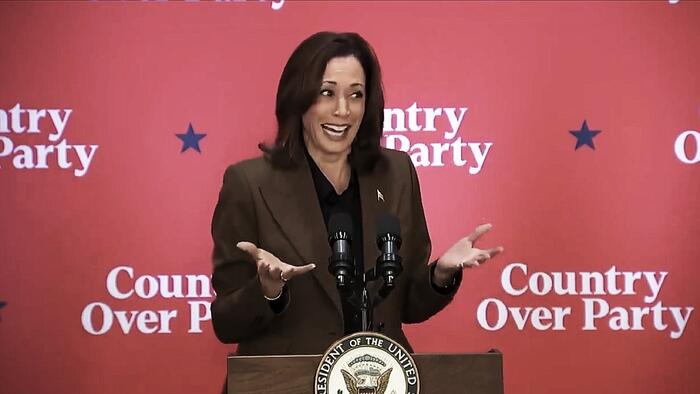Kamala Harris recently drew considerable attention during a speech where she commented on the upcoming election, describing it as “packed with some stuff” and punctuating her statement with laughter. This comment has since sparked criticism, particularly regarding her perceived lack of substance and coherence. Observers noted that her remarks, seemingly lacking depth or clarity, were met with incredulity and laughter—not the kind intended to unite but rather to question her credibility. Social media reactions highlighted the absurdity of her phrasing, which many found unbecoming for someone in her position.
In her speech, Harris shifted to concerns regarding Donald Trump, alleging that he would misuse the Department of Justice against his political adversaries. While the claim resonated with some supporters, critics were quick to point out the irony, given her own administration’s handling of various issues. This juxtaposition raised eyebrows, considering the chaotic cabinet turnover and reported dissatisfaction among her staff members during her tenure as Vice President. The statistics paint a grim picture, with reports of a staggering 92% staff turnover rate that has been used to question her leadership skills.
Harris attempted to portray herself as a unifying leader who engages people and encourages open dialogue. However, this claim contradicted reports from former aides who have left her office, often citing a challenging work environment as their reason for departure. This dissonance between her self-image and the reality experienced by those who have worked closely with her further undermines her assertions during public appearances. Critics argue that her leadership style is ineffective, making it difficult for her to rally support or maintain cohesive teams.
Doubt about Harris’s capabilities also centers on her ability to think on her feet, with many commentators questioning how well she would perform under pressure if she were ever to ascend to the presidency. The overall sentiment among opponents and even some neutral observers points to a pervasive belief that her verbal gaffes could be detrimental to her effectiveness in high-stakes situations. Supporters of Donald Trump seized the opportunity to frame her comments as evidence of a broader concern about her qualifications for higher office.
The backlash against Harris’s speech has only amplified calls among critics for her to consider stepping aside from her campaign. Many observers resonated with the sentiment that her comments reflect a pattern of ineptitude more fitting for satire than serious discourse on a national stage. The general tone of the reactions underscored a desire among some voters for a competent and coherent leader—ideal attributes many felt were absent in Harris’s recent delivery.
In conclusion, Kamala Harris’s latest public appearance has drawn significant scrutiny, with detractors ridiculing her remarks as indicative of a larger problem with her leadership and communications skills. As the election looms closer, many observers are concerned that her perceived inadequacies could not only hinder her own aspirations but also negatively impact the Democratic Party’s chances in the upcoming elections. The incident serves as a reminder of the importance of articulate communication in politics, where every misstep can be magnified and potentially define a candidate’s viability in the race.

